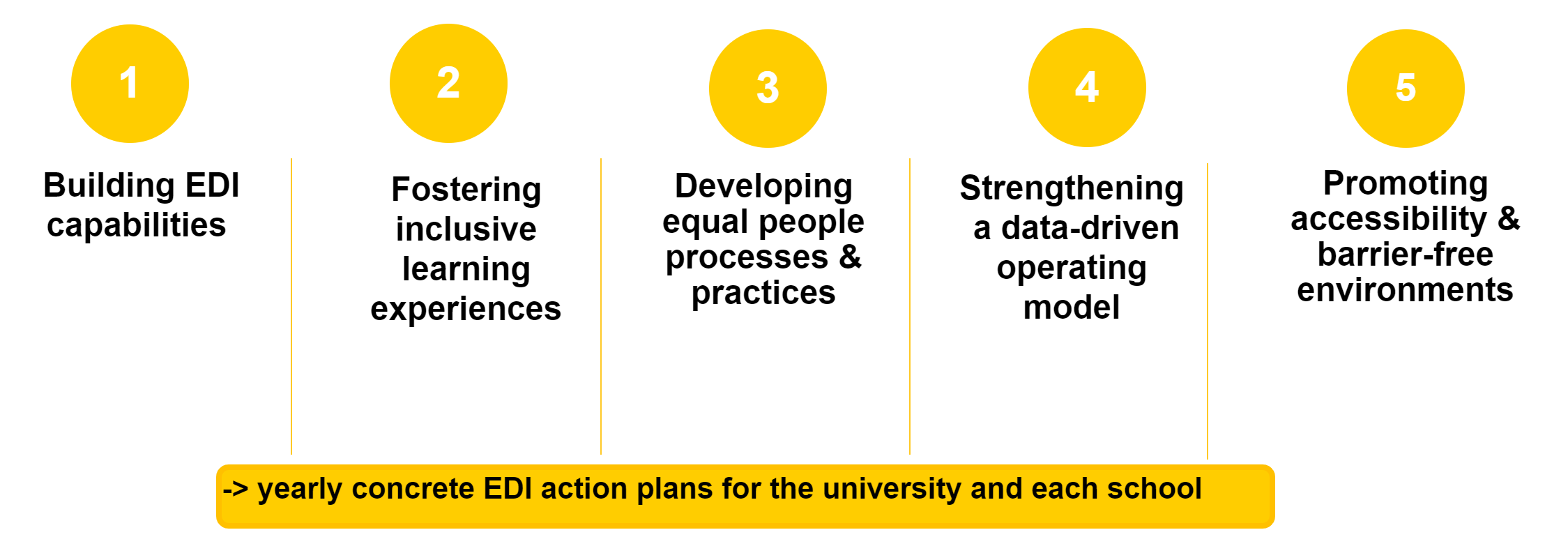Equality, Diversity and Inclusion (EDI) was chosen to be the theme of our learning organisation and benchlearning based on our community input and discussion. The Aalto Management Team agreed on the importance of this evaluation area in 2021. Aalto considers a comprehensive assessment of EDI vital for understanding how well it is being managed and implemented and for further developing EDI through insights from the evaluation and lessons from the benchlearning.
EDI is part of our core values, supporting our community’s wellbeing, creativity and ability to foster world-class research, teaching and impact. We actively work towards providing an inclusive and accessible environment in which employees and students from diverse backgrounds are treated equally and are free to work and study without fear of discrimination. Our operating model stresses community engagement, accountability, and proactive and systematic development. All community members have a responsibility to build equality, diversity and inclusion locally in their own environment.
The Aalto University EDI Plan defines the ways in which we promote EDI in our community: the current status, recent developments and development plans for a three-year period. The EDI Plan outlines five development areas and feeds into the annual action plans, which outline concrete action steps for each year at the university level and in each of Aalto’s six schools (see figure 8). The EDI Plan was built in a community-driven manner through the participation of faculty, staff and students.

Figure 8. Aalto’s EDI plan
Building EDI capabilities
Based on the 2021 Employee Wellbeing Survey, the overall experience of equality, diversity and inclusion at Aalto is at a good level (average 4.17 on a scale of 1 to 5), but there is variation across different demographics. Personnel with a nationality other than Finnish assess their experience positively but indicate that better support is needed for spouses and families, as well as for understanding Finnish culture, language and working life opportunities. The Aalto community continues to grow more diverse. During 2022-2024, we will take further actions to facilitate making all students and personnel feel included in the Aalto community by building EDI awareness, communication and competencies further and by focusing on psychological safety, inclusive communications and inclusion of diverse minorities. After COVID-19, a sense of belonging and togetherness needs to be fostered through grass-roots level activities to promote an inclusive environment. We organise monthly EDI discussions for Aalto personnel as part of our efforts to enhance the EDI awareness of the Aalto community.
Fostering inclusive learning experience
The diversity of Aalto’s student body is gradually increasing. The results of the 2022 ‘AllWell?’ student questionnaire indicate that the overall wellbeing of Aalto’s students decreased during the COVID-19 pandemic. The largest single factor contributing to this was a lack of peer support, and this remains a key development area. During 2022-2024, we will continue to work to attract diverse students to Aalto’s educational programmes and will also continue joint EDI development work with the Aalto University Student Union (AYY) and student associations. Specific development areas focus on inclusive teaching and learning practices and equality and consistency of supervision.
Developing equal people processes and practices
The share of women in academic positions is improving but continues to be a development area. Aalto is the 40th most international university in the world (THE Most international universities 2022), with a highly diverse international faculty, but the share of international service personnel is still a clear development area. The share of women among heads of departments is 15%, which also represents a clear development area. During 2022-24, we will take actions to embed equality, diversity and inclusion further into the recruitment and onboarding processes, widen mentoring and support in career paths, and continue to use job pay analyses to achieve equal pay. Specific development areas are holistic well-being and improving diversity in management and service positions.
Strengthening a data-driven operating model
The management and development of EDI work is part of Aalto University’s overall quality system of continuous development and is aligned with the university’s planning cycle. The Provost, supported by the EDI Officer and EDI Committee, is responsible for equality, diversity and inclusion development work at the university level, and the Deans, supported by the schools’ Development Managers (or equivalent), are responsible at the school level. School-level EDI Task Forces (or equivalent bodies) make annual action plans for their school and follow up on these. The EDI actors monitor EDI statistics annually. By linking EDI to the university’s annual clock, we systematically monitor Aalto’s progress toward the 2022-2024 EDI goals outlined in this document. We are aiming for even tighter alignment between EDI and our annual management processes.
Promoting accessibility and barrier-free environments
Based on the 2021 Employee Wellbeing Survey, the overall experience of the accessibility of university facilities is at a good level (average 4.04 on a scale of 1-5). However, experiences vary between demographics. We will focus on building awareness and ensuring the competence of our employees regarding both physical and digital accessibility. We will also further develop ways to measure accessibility and use data to prioritise development work (for example, accessibility inspections of each of Aalto University’s buildings).
At Aalto, we evaluated our current EDI state in five areas as a part of the University Review process. Our strengths and enhancement areas are summarised in the table below. More detailed development actions are included in our EDI plan.
Aalto University expects to receive recommendations that would be relevant for addressing the enhancement areas identified in the table below.
| Strengths | Enhancement areas | |
| Building EDI capabilities
|
|
|
| Fostering an inclusive learning experience
|
|
|
| Developing equal people processes & practices
|
|
|
| Strengthening a data-driven
operating model
|
|
|
| Promoting
accessibility and barrier-free environments
|
|
|